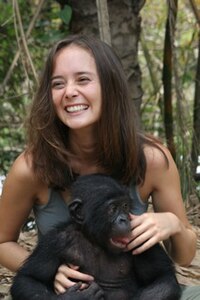|
Vanessa Woods
Vanessa Woods (born 1977) is an Australian science writer, author and journalist, and is the main Australian/New Zealand feature writer for the Discovery Channel.[1][2] A graduate of the Australian National University with a Master's degree in Science Communication,[3] and an author of children's books,[3] she is best known for her work in both the Republic of the Congo and the Democratic Republic of the Congo comparing the different cooperative behaviors of bonobos and common chimpanzees.[4][5] Her mother is of Chinese descent.[6] She is the author of Bonobo Handshake: A Memoir of Love and Adventure in the Congo and It's Every Monkey for Themselves: A True Story of Sex, Love, and Lies in the Jungle. CareerWorking with colleagues from the Max Planck Institute for Evolutionary Anthropology in Leipzig, Germany, she spent 10 months in the Democratic Republic of Congo studying bonobos, a species of great ape as genetically close to humans as the Common Chimpanzee, in order to make comparisons between the behaviors of humankind and ape.[7][8][9][10][11] She wrote an in-depth report on killer bees encountered during her studies in Costa Rica,[12] and has also written a piece on the yearly cherry blossom experience in Kyoto, Japan.[13] Partial bibliography
Children's books
Awards and recognitionIn 2003, Woods won the Australasian Science Award for journalism.[3] In 2007, her children's book on space, It's True! Space turns you into spaghetti, was named an Acclaimed Book by the UK Royal Society and shortlisted for the Royal Society's Junior Science Book Prize. References
External links |
||||||||||||||||
